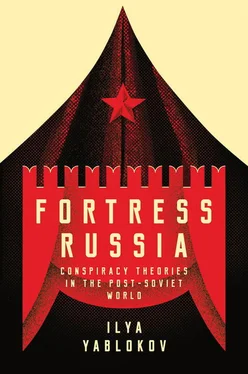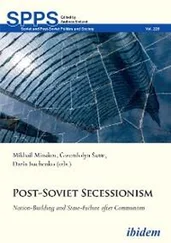Ukraine, ‘The Puppet State’
Euromaidan, the protest of Ukrainians against president Yanukovich and his crony regime, was not only a matter of concern for the Ukrainian ex-President, but also for the Russian authorities. From the Russian perspective, signing the EU agreement would open the door to an influx of untaxed goods from the EU and bring Ukraine closer to the sphere of EU influence. This was seen by both the Ukrainian authorities and the protesters as the first step on the road to becoming part of the EU. It was meant to send a strong signal to the Europeanized element in Ukrainian society, which regarded the ever-present Russian influence as an undesirable hangover from the past (Snyder, 2015). Yanukovich’s refusal to sign the EU agreement, and his decision to opt instead for an economic deal with Russia, reinforced by the repressive legislation of 16 January 2014, triggered clashes with the police and became one of the milestones in the process of overthrowing the regime (Wilson, 2014).
The rapid escalation of the conflict in Kyiv resulted in the defection of Yanukovich to Russia and the victory of the pro-US and pro-European forces. This was interpreted by the Russian authorities as evidence of a Western plan to interfere in the post-Soviet space and a potential threat to Russian security. In the aftermath of the February revolution in Kyiv, an image of the Ukrainian government as ‘Other’ was achieved by portraying Ukraine as Russia’s main enemy and insisting that Ukraine’s new revolutionary leadership was controlled by the US government. This, it seems, had the required result: in the polls, the USA and Ukraine currently occupy the top positions in Russia’s list of adversaries (Levada-tsentr, 2017). Russian journalists and political elites created a connection between the new post-revolutionary Ukraine, whose leadership opposed the Russian establishment’s support of Yanukovich, and Russia’s geopolitical archenemy, the USA. A leaked tape of a conversation between the US ambassador to Ukraine, Geoffrey Pyatt, and Assistant Secretary of State, Victoria Nuland, in which they discussed possible members of the new Ukrainian government, became key evidence that the USA was in full control of Ukraine (BBC, 2014). The former Ukrainian political leadership – ex-prime minister Azarov and Yanukovich himself – reinforced this notion by describing the new leaders as ‘American puppets’ (BBC, 2015; RIA Novosti, 2016).
Russian state-aligned media continuously repeated and developed the idea of Ukraine as a ‘puppet state’ in their reports. Anonymous sources suggested that after the presidential elections the newly elected president, Petro Poroshenko, spent the night at the US embassy and that the ambassador convinced him to start the invasion of the Donbass and promised that its negative consequences would be downplayed in the Western press (Kiselev and Rozhkov, 2014b). Another set of reports suggested that the CIA and the White House stood behind the rise of the Ukrainian revolutionaries as well as the invasion of Eastern Ukraine, and had sent troops and money to support the Ukrainian forces (Kiselev, 2015a; Kiselev, 2016a). Kiselev’s Vesti Nedeli suggested that the CIA had masterminded the attacks against rebellious Eastern Ukrainian regions and that the operation in Eastern Ukraine began after the CIA director visited Kyiv under a false name (RIA Novosti, 2014).
When the US Vice-President, Joe Biden, visited Kyiv, the Vesti Nedeli reporter mentioned the American flag waving over the Ukrainian parliament building, and the US Ambassador chairing a meeting with Ukrainian deputies. Against the background of a shot of Biden with the words ‘The Verkhovna Rada of Ukraine’ (The Ukrainian Parliament) on show behind him, the reporter explained that the US Ambassador settled the US vice-president into the Ukrainian Speaker’s chair, ‘as if [he wanted] to demonstrate who really ruled the country’ (Kiselev and Balitskii, 2014).
From 2014, an exceptional number of high profile Russian politicians gave statements asserting that there was an intimate relationship between the USA and the new Ukrainian government. For example, Nikolai Patrushev, head of the FSB from 1999 to 2008 and now Secretary of the Security Council, openly claimed that the USA was the main instigator of the Ukrainian conflict. For Patrushev, it was clear that the motive behind the Ukraine crisis was not a desire on the part of Ukrainians for the country to be more democratic; rather, it was about the USA’s desire to create a new generation of Ukrainians who despised Russia and who would ensure that Ukraine was removed from Russia’s sphere of influence. It was trying to bring this about by financing anti-Russian NGOs in Ukraine (Rostovskii, 2016).
During the Ukraine crisis, Patrushev has been the main conspiratorial spokesman of the Russian elites. His regular interviews provide a portal into the mind-set of the Kremlin bureaucrats. Patrushev interpreted the conflict as another step in the US plan to dismantle Russia, divide it up and acquire its natural resources (Egorov, 2014). In a twist, Ratnikov’s 2006 story about ‘Madeleine Albright’s mind’, [6]which posited that the US hated Russia for its abundance of natural resources, resurfaced in Patrushev’s interviews. On several occasions, Patrushev referred to this story as if it were undisputed fact; the Kremlin’s policies in Ukraine were hence justified, as they provided some protection from the American-led war against the Russian state (see Egorov, 2014; Chernenko, 2015). Propaganda videos released at that time reiterated Patrushev’s point of view: Russia’s actions were a defensive operation to prevent further escalation of the war against Russia itself. The makers of the videos suggested that the Ukraine crisis was a pretext for the USA to start World War 3, occupy Russia and confiscate its natural resources, which would allow the USA to prosper economically (Okeiamnet, 2014). Hence, the conspiratorial story which began as rhetoric, a means of criticizing the USA during the challenging period of the presidential succession from Putin to Medvedev in 2006–7, later developed into a mainstream tool used by top-ranking Russian politicians to explain global politics (Etkind and Yablokov, 2017).
Kiselev’s Vesti Nedeli also featured the US conspiracy against Ukraine and Russia to take over natural resources. In one of the programmes the presenter contended that the ‘real’ purpose of the Ukrainian military invasion of Eastern Ukraine in May 2014 was for the USA to gain control of the rich natural resources located in the Donbass region. A report broadcast on 18 May 2014 showed two maps: the first was of the territories in Ukraine with the allegedly richest natural resources, and the second was of the battleground in Eastern Ukraine. The two maps overlapped, showing that the centres of conflict between Ukrainian and separatist forces were located precisely in the areas most rich in resources. According to Kiselev, the appointment of Joe Biden’s son, Hunter, to the board of the private Ukrainian oil and gas company Burisma (Risen, 2015) was a clear indication of the reasons behind the White House’s interest in Ukrainian domestic affairs:
The Americans act with Ukrainian nationalists like [Europeans] with aboriginals, as if [the Ukrainians] were a wild tribe. [The Americans] tell them about democracy, while thinking of [the Ukrainian] fossil fuels. It is a usual thing to wage wars for fossil fuels. However, it’s not fashionable for Americans to do that. Let the aboriginals do that instead. (Kiselev and Bogdanov, 2014)
This quotation exemplifies the attitude of the pro-Kremlin Russian elite who, through conspiratorial discourse, seek to denigrate the importance and political/intellectual capability of the Ukrainian elite, as compared to those of Putin’s Russia. In the narratives of Russian pro-state speakers, Ukrainians are not citizens of an independent nation, but rather as a mob controlled from abroad. This negative image of Ukrainians reflects some of the ideas enshrined in Surkov’s theory of sovereign democracy which were implanted in the public consciousness in the 2000s. The close connection between the idea of Russia’s greatness and the Russian elites’ fear of losing control of Ukraine generated a wave of conspiracy panics which demonstrated the Kremlin’s concern about losing part of its sphere of influence, and were aimed at demonizing Ukraine in the eyes of television audiences for Russia’s political ends.
Читать дальше
Конец ознакомительного отрывка
Купить книгу












